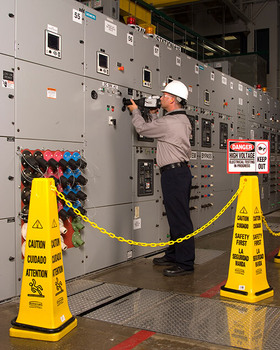
Most electrical equipment generates heat during normal operations. Usually, this heat is safely dissipated on its own. However, problems can develop when components generate excessive heat due to corrosion, loose connections, or overload. Infrared (IR) inspections identify these abnormal thermal rises in electrical and mechanical equipment before they cause an unplanned outage.
Annual IR scans are part of the National Fire Protection Association’s Recommended Practice for Electrical Equipment Maintenance (NFPA 70B) and are recommended by most insurance companies. They allow you to easily detect hot spots in your critical facility. However, not all infrared scan are the same. Vertiv’s electrical infrastructure experts use state-of-the-art cameras to clearly understand where electrical connections and components have degraded. Information gathered helps you determine how to best address these hot spots before they result in serious problems that can lead to unplanned downtime.
More information Manufacturer's Website
Technical Summary
Online, Non-Intrusive Testing
Infrared inspections are performed while equipment is energized and operating, avoiding any disruption to business. Unlike many predictive maintenance tests, infrared inspections do not require physical contact with the equipment.
Two simple requirements are necessary for testing. Enclosures must be open, allowing equipment to be in a direct line of sight (if infrared window/port is unavailable) and equipment must carry a load current during inspection.
Expert Analysis & Advanced Testing Equipment
Two factors can significantly alter the accuracy of an infrared inspection: the testing equipment and the thermographer performing the test.
For these reasons, it is important to choose a reputable company with the necessary qualifications, equipment, and experience to perform an accurate infrared inspection. Vertiv™ has more than 40 years of testing experience. Combining the best technicians with the most up-todate, well-maintained equipment allows us to detect even the smallest temperature differential quickly and efficiently.
Our experts routinely use infrared inspection to test the following types of equipment and components:
- Substation transformers
- Capacitors banks
- Switches
- Fuses
- Circuit breakers
- Busbars
- Cable splicing
- Motors
- Motor control centers (MCC)
Comprehensive Report of Findings
As a critical part of a complete predictive or condition-based maintenance program, infrared inspection findings are carefully documented in a comprehensive electronic and/or paper report that includes the following:
- High-resolution, color-digitized photographs and thermograms
- Recommendations for correction or repair
- Timely delivery of results prior to scheduled maintenance
Brochures
Manuals
Technical Specs
Resources
Related Pages
- Arc Flash Studies and Training
- Circuit Breaker Testing
- Energy Recommendations - Return on Investment
- Electrical Assessment
- Electrical Safety Training
- Ground Fault Testing
- Load Testing
- NERC Compliance Services
- One-Line Diagrams
- Partial Discharge Testing
- Permanently Mounted Sensors
- Power Quality Studies and Harmonic Analyses
- Power System Reliability Studies
- Protective Relay Maintenance and Testing
- Relay Design and Integration
- Safety Audits
- Short Circuit and Coordination Studies
- Thermal Control Optimization
- Transformer PM